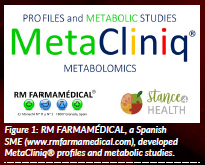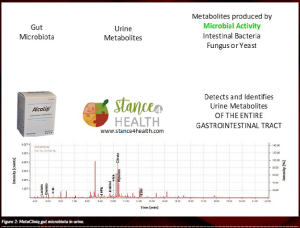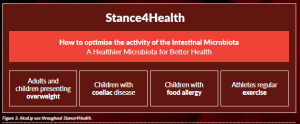Unhealthy dietary patterns are leading to an increase in non-communicable diseases, and great efforts are being paid to promote healthier diets and lifestyles around the world. The Stance4Health project, funded by European Union’s Horizon 2020 research and innovation programme, proposes a complete smart personalised nutrition (SPN) service based on the use of mobile technologies, tailored food production and a metabolomics test that will optimise the gut microbiota activity and promote long-term consumer engagement (Hinojosa-Nogueira et al., 2020).
The gut microbiota is now known to affect host health at different levels: competing with pathogens, interacting with the immune system or producing either beneficial or detrimental metabolites (Marungruang et al., 2016). Hence, it is thought to play a critical role in the modulation of host physiological processes related to chronic diseases (obesity, type II diabetes, etc.). The microbiota feeds on dietary components that remain undigested in the upper gut and ferment them to different health-affecting substances, which are metabolised by the human host and excreted mainly in urine (Tremaroli and Bäckhed, 2012).
MetaCliniq in personalised nutrition
RM FARMAMÉDICAL, a Spanish SME (www.rmfarmamedical.com), developed MetaCliniq® profiles and metabolic studies (Figure 1). This is an in vitro test carried out with biological (urine, blood, cerebrospinal fluid) and culture media samples, collected and stabilised on filter paper. These filter papers are then dried and sent at ambient temperature for analysis. This single test shows what is happening at the metabolic level.
Many studies have demonstrated the validity of collecting biological fluids, either blood or urine, on filter paper for analysis (Hampe et al., 2017). Nowadays, such a technique is used worldwide to detect well-known diseases, such as Phenylketonuria, in public health programmes. The collection of samples in filter paper:
- improves the quality of the sample to be analysed
- stabilises metabolites
- blocks enzymatic activity that degrades metabolites, inactivating ongoing metabolism
- preserves the integrity of the sample
- avoids degradation and loss of metabolites
- enables adequate ranges of metabolite concentration to be obtained
- avoids freeze-thaw cycles that lead to a loss of quality.
RM FARMAMÉDICAL participates as a partner with MetaCliniq and the nutraceutical AlcaLip in the Stance4Health project. MetaCliniq will be used throughout the project in a large clinical study to rule out metabolic alterations and analyse the gut microbiota activity in urine samples. Urine is a biological matrix that contains hundreds of metabolic end products at various concentrations (Khodadadi & Pourfarzam, 2020). Its use presents a number of important advantages over the use of blood samples. Firstly, urine can be collected easily, in large quantities, and in a non-invasive way, which makes it less annoying for the patient (Jóźwik & Kałużna-Czaplińska, 2016). Conversely, the use of dry urine samples has the added advantage of inactivating the ongoing metabolism of the sample (Hampe et al., 2017).
MetaCliniq enables the ability to carry out a global study of the metabolites and co-metabolites that participate in the metabolic routes, either at starting or finishing point or in the intermediary metabolism. MetaCliniq also enables the detection and identification of metabolism disorders of different groups of diseases and alterations, including amino acids, carbohydrates, fatty acids, purines and pyrimidines. Conversely, in urine, it reveals the metabolic impact of the intestinal microbiota, the possible damage that it may be causing in the whole organism and possible microbiotarelated imbalances (López-Maldonado et al., 2021).
In urine, MetaCliniq can detect and identify by gas chromatography-mass spectrometry (GC-MS) the metabolites produced by the microbial metabolic activity of intestinal bacteria, fungi or yeasts (Figure 2). In this sense, GC-MS has shown to have a high sensitivity and specificity, making it one of the preferred techniques for conducting urinary metabolomic investigations (Jóźwik & Kałużna-Czaplińska, 2016; Khodadadi & Pourfarzam, 2020). Moreover, GCMS has a long history of achievements in the description of complex biological systems (Khodadadi & Pourfarzam, 2020). In relation to urine samples, it has especially been used in mass-screening tests for early diagnosis and treatment of the inborn errors of metabolism (Hao et al., 2015; Hampe et al., 2017).
MetaCliniq provides excellent clinical and scientific value since it obtains more metabolites from the analysed sample and offers a personalised integration and interpretation of all the results. The system achieves extraction, detection, identification, integration and interpretation of more metabolites from the sample. RM FARMAMÉDICAL works with professional experts with extensive experience in metabolomics, metabolism and inborn errors of the metabolism, which provides great scientific value for the researcher and significant clinical value for the doctor.
AlcaLip in personalised nutrition
The objective of Stance4Health, as stated previously, is to develop a personalised nutrition service based on the use of mobile technologies, as well as the production of food and nutraceuticals, as it will optimise the activity of the intestinal microbiota and the consumer’s commitment to longterm use (Figure 3).
AlcaLip is a nutraceutical with demonstrated activity in the mitochondria (López-Maldonado et al., 2021). AlcaLip protects against oxidative damage and has a high antioxidant capacity against hydroxyl radicals and a high reduction capacity against ferric iron at the cellular and mitochondrial level. AlcaLip also works by improving mitochondrial function and metabolisation. AlcaLip takes action in the Krebs cycle, favouring metabolic activity but does not act as a pro-oxidant. Therefore, AlcaLip is a mitochondrial protector that will be used throughout the nutritional intervention of the Stance4Health project in adult athletes and children with coeliac disease, obesity or an allergy to cow’s milk.
Figure legends
Figure 1: RM FARMAMÉDICAL, a Spanish SME (www.rmfarmamedical.com), developed MetaCliniq® profiles and metabolic studies.
Figure 2: MetaCliniq gut microbiota in urine.
Figure 3: AlcaLip use throughout Stance4Health.
References
Hampe, M. H., Panaskar, S. N., Yadav, A. A., and Ingale, P. W. (2017)‘Gas chromatography/mass spectrometry-based urine metabolome study in children for inborn errors of metabolism: An Indian experience’, Clinical Biochemistry, 50(3), pp. 121–126.
Hinojosa-Nogueira, D., Pérez-Burillo, S., Pastoriza, S. and Rufián-Henares, J.A. (2020) ‘Smart technologies for personalized nutrition and consumer engagement’, The Project Repository Journal, 7(October), pp. 80—84.
Jóźwik, J., and Kałużna-Czaplińska, J. (2016) ‘Current Applications of Chromatographic Methods in the Study of Human Body Fluids for Diagnosing Disorders’, Critical Reviews in Analytical Chemistry, 46(1), pp. 1–14.
Khodadadi, M. and Pourfarzam, M. (2020) ‘A review of strategies for untargeted urinary metabolomic analysis using gas chromatography–mass spectrometry’, Metabolomics, 16(6), pp. 1–14.
López-Maldonado, A., Pastoriza, S. and Rufián-Henares, J.A. (2021) ‘Assessing the antioxidant and metabolic effect of an alpha-lipoic acid and acetyl-L-carnitine nutraceutical’, Current Research in Food Science, 4, pp. 336–344.
Marungruang, N., Fak, F. and tareke, E. (2016). ‘Heat-treated high-fat diet modifies gut microbiota and metabolic markers in apoe−/− mice’, Nutrition & Metabolism, 13: 22. Tremaroli, V. and Bäckhed, F. (2012). ‘Functional interactions between the gut microbiota and host metabolism’, Nature, 13, pp. 242–249.
Article summary
PROJECT SUMMARY
The overall objective of Stance4Health is to develop a complete smart personalised nutrition service based on the use of mobile technologies as well as tailored food production that will optimise the gut microbiota activity and long-term consumer engagement. The project will focus on the adult population (lean and overweight people) and children (lean, obese coeliac disease or food allergy).
PROJECT LEAD PROFILE
Stance4Health is led by Prof. José Ángel Rufián-Henares, Professor of Nutrition and Food Sciences at the University of Granada (Spain). Prof. Rufián-Henares has a strong background in food processing, food composition analysis and the effect of food on gut microbiota composition and functionality.
PROJECT PARTNERS
The Stance4Health consortium consists of 19 partners from 8 European countries (Spain, Germany, Denmark, Romania, Italy, Greece, Belgium, UK). Six SMEs will be in charge of developing and the future commercialisation of a new app for personalised nutrition, tailored cerealderived foods, one nutraceutical and one in vitro diagnostic test to control the gut microbiota activity.
CONTACT DETAILS
José Ángel Rufián Henares
Departamento de Nutrición y Bromatología, Facultad de Farmacia, Campus de Cartuja S/N, 10871, Granada, España.
Tel: +34 958 24 28 41
Email: jarufian@ugr.es
Web: www.stance4health.com
Twitter: @Stance4Health
Facebook: Stance4Health
LinkedIn: Stance4Health
FUNDING
This project has received funding from the European Union’s Horizon 2020 research and innovation programme under grant agreement No. 816303.




